Hell-Ship Morgan
Brief Synopsis
Cast & Crew
D. Ross Lederman
George Bancroft
Ann Sothern
Victor Jory
George Regas
Howard Hickman
Film Details
Technical Specs

Synopsis
Stern sea captain Ira Morgan, better known as "Hell-Ship Morgan," commands the tuna fishing vessel the Southern Cross . Morgan always docks his boat at the San Pedro, California harbor, where, one day, a stranger refuses his invitation to a drink. After punching the man, Jim Allen, Ira learns that he is weak from hunger, and takes him aboard his boat. When the captain discovers that Jim shares his low opinion of women, the two become fast friends. Later, Morgan meets Mary Taylor, and when he learns that she too is penniless, takes her under his wing, much to the disappointment of Jim. A romance between Morgan and Mary soon blossoms, and after they are married, Morgan takes her and Jim on his next expedition. During the voyage, Jim and Mary fall in love, and the two are caught in an embrace by crew member Covanci. Covanci blackmails Mary, demanding demanding that she give him a valuable pearl that Morgan gave her to keep his silence. Later, Morgan punches the blackmailer and finds the pearl in his possession. Covanci tells the captain about his wife's affair, and when Morgan confronts Mary, she bravely confesses to having fallen in love with Jim. The confrontation is soon interrupted by a violent storm that causes damage to the ship's bowsprit. Morgan convinces Jim to go over the bow and repair the boat, but while doing so he falls into the water. Morgan succeeds in rescuing Jim, but he suffers a broken back in the process and is crippled for life. The ship survives the storm, and Mary tells her husband that she has decided to remain with him. Morgan, however, decides to commit suicide by throwing himself overboard, to be eaten by sharks.

Director

D. Ross Lederman
Cast

George Bancroft

Ann Sothern

Victor Jory
George Regas

Howard Hickman
Ralph Byrd
Rollo Lloyd
Fred "snowflake" Toones
Arthur Rankin
Harry C. Bradley
Stanley Blystone
Eddie Sturgis
Mike Lally

Slim Whittaker
Joe Bordeaux
Steve Clark
Ernie Adams
Gene Mckay
Nick Baskovitch
Ed Anshutz
Paul Schwegler
Charles Hamilton
Don Roberts
Lew Meehan
Larry Fisher
Allen Good
Pete Rasch
Jack Haflie
Robert Wilber
Renee Whitney
Helen Lynch
Carlotta Monti
Gloria Gould
Crew
Irving Briskin
George Cooper
E. Roy Davidson
Henry Freulich
Frank Hill
Samuel Lange
Jack Long
Otto Meyer
Robert North
Helen Parker
Jack Rea
George Rhein
Harold Shumate
Jack Stewart
Mary Wiggins

Film Details
Technical Specs

Articles
TCM Remembers - Ann Sothern

TCM Remembers - Ann Sothern
Quotes
Trivia
Notes
Working titles for this film were Man Proof and Shark Bait. The file for the film in the MPAA/PCA Collection at the AMPAS Library indicates that the PCA informed Columbia in September 1935 that the first draft of the script did not conform to provisions of the Production Code concerning "sex suggestiveness" and suicide. Specifically, the Hays Office's objections to the script included the indication that "Mary is willing to prostitute herself with Morgan, and his evident acceptance of her offer," and a scene in which the character Jim makes "an indecent proposition to Mary." The Hays Office also complained about the "offensive dialogue with regard to women," and protested the fact that Morgan murders his wife's paramour without consequence. In response to the PCA's criticisms, Columbia reportedly informed the agency that it would rewrite the script, substituting the "offensive sex implications" with a "straight triangular love story," and remove the murder. An October 1935 PCA memorandum indicates that the original ending, in which Morgan kills himself in order to clear the way for Mary and Jim to resume their romance, was to be rewritten "so as to definitely indicate that Morgan's suicide is motivated by the fact that he is crippled for life and will not be able to continue his fishing career." Two weeks prior to the film's release, the Hays Office, in a letter to M-G-M protesting its use of the title Hell's Heroes for an upcoming release, wrote that although the agency was limiting the use of the word "hell" in film titles, Hell-Ship Morgan would be exempted from the rule because "hell-ship" described "a ship where cruelty toward the crew was the rule."














